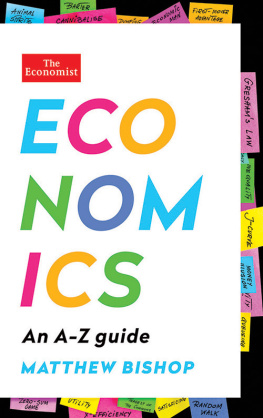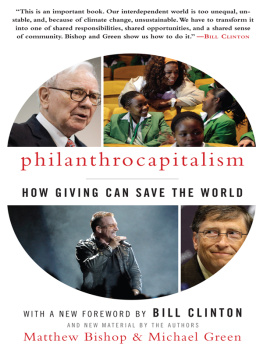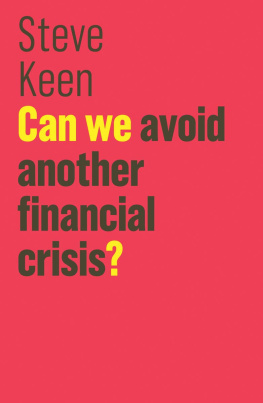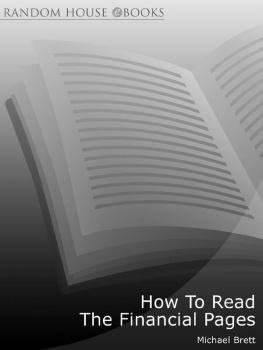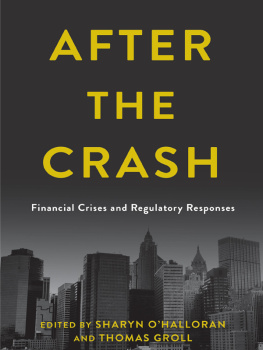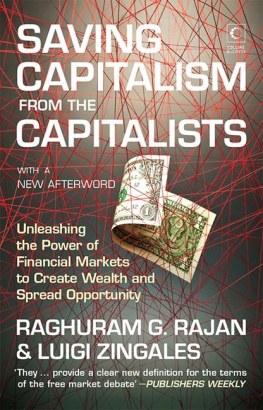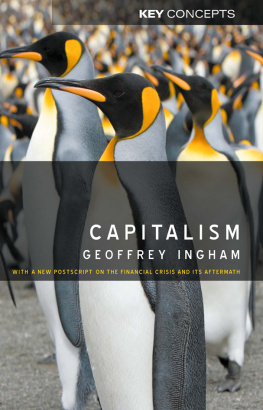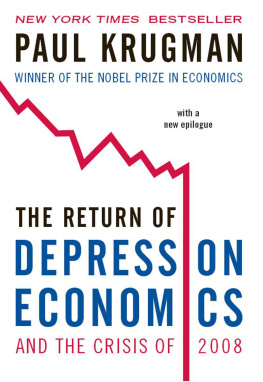THE ROAD FROM RUIN
A New Capitalism
for a Big Society
Matthew Bishop & Michael Green

CONTENTS
PART ONE: THE ROAD TO RUIN
How things go wrong
How innovation leads to bubbles
How governments people the world with fools
A brief history of global imbalances
How inaction leads to depression
Dont throw out the baby with the bathwater
Towards a less dismal science
The world must redesign how it is governed
Capitalism must rediscover its soul
Making the right choices means increasing the wisdom of crowds
CONCLUSION:
A NEW CAPITALISM FOR A BIG SOCIETY
To Alan Russell, a dedicated teacher and fine economist who showed us that the dismal science need not be dull.
BRITAINS ROAD FROM RUIN
History may judge the general election of May 2010 as important as those of 1906, 1945 and 1979 in radically redefining British capitalism and the future role of the state. If so, this will be a somewhat ironic outcome: for the new government was an accident, with no clear mandate for radical change, born out of a freak election result that delivered Britains first peace time coalition rule since the 1930s. To the Conservatives, the leading party in the Coalition, unexpectedly sharing power came as a disappointment that seemed likely to curb their ambitions for radical change, while to the media the most radical aspect of the new government seemed to be the surprisingly warm relations between the new Conservative prime minister, David Cameron, and his Liberal Democrat deputy prime minister, Nick Clegg, which they likened to a gay marriage. Nonetheless, the new government set about its work with such vigour that, after barely three months in office, The Economist wrote that in its first 100 days the Con-Lib coalition has emerged as a radical force and the Wests test tube.
A radical government is certainly needed so long as it is the right sort of radical. The Coalition took charge as Britain struggled to escape from the deepest recession in more than half a century, after a catastrophic collapse of the financial system that had revealed fundamental flaws in the pro-market economic orthodoxy of the previous thirty years.
The three great reforming governments of the twentieth century also took power at times of economic and social turmoil and implemented radical reforms that reshaped the relationship between the state and the market for a generation. The New Liberals elected in 1906 gave birth to the welfare state with their Peoples Budget. Clement Attlees 1945 Labour Government took the commanding heights of the economy into public ownership and created the National Health Service. And, starting in 1979, Margaret Thatchers Conservatives privatised and unleashed the market.
Although controversial at first, by the mid-1990s the Thatcherite settlement between state and market had become the bipartisan consensus, cemented by the election of Tony Blairs market-friendly New Labour government in 1997. Over the three decades before the financial collapse, Britain had helped turn this conventional wisdom about the roles of the state and market into a global faith.
It was not until the autumn of 2007 that the first serious evidence emerged that this orthodoxy was flawed and a new approach would be needed. The cracks began to appear when what was now Gordon Browns Labour government reluctantly intervened to rescue and ultimately nationalise a failed mortgage lender, Northern Rock, after the supposedly always-open credit markets on which the bank depended froze shut. Then, on September 14th 2008, the conventional wisdom imploded along with Lehman Brothers, a big New York investment bank with significant operations in Canary Wharf, which became the worlds biggest ever bankruptcy. The ensuing panic triggered the worst economic crisis in the developed world since the 1930s.
In the aftermath of Lehmans failure, as asset values plunged and banks even stopped lending to each other, the British government played a leading role in working with its counterparts around the world to deal with the mess. They together splashed billions of pounds and trillions of dollars in a co-ordinated effort to save the worlds financial institutions from the toxic assets on their balance sheets. With this help, the banks survived albeit at enormous cost to taxpayers everywhere.
While this emergency rescue of the financial system by massive government intervention was ultimately quite impressive, restoring confidence to the firms and individuals that make up the economy has proved far harder. In large part, we believe, this is because the collapse of the old conventional wisdom about the roles of state and market has left an intellectual void that has yet to be filled. Dealing with the toxic ideas that led to the crisis is now just as important as cleaning up the toxic assets left in its wake. Until we have come up with better ideas, how can any business leader, worker or consumer go about his or her life with confidence that the economy is now on a sustainable road from ruin to recovery, rather than just another bad week in the City away from the next Great Depression?
The time has come for a fundamental overhaul of the British model of capitalism, to create the better markets and better government needed to thrive in what is likely to remain a turbulent global economy in the decades ahead. The crisis has revealed serious flaws in the relatively laissez-faire approach that had been taken towards the market, and in particular the financial markets. Yet the initial enthusiasm (in countries such as America, as well as Britain) for a return to bigger government has proved short lived, and not just because a sovereign debt panic in Europe reminded everyone that governments, Britains included, needed to get their finances in order. During the boom years the Labour Government had experimented with throwing public money at almost every problem, with decreasing effectiveness. According to Mr Blair (admittedly not an impartial observer), Labours defeat in 2010 owed much to the post-crisis embrace by his successor, Mr Brown, of a big government Keynesian approach that seemed merely to turn back the clock, rather than to learn from what had gone wrong.
The early actions by the new Coalition government showed that it understood the need to take a radically different approach to that of its predecessors to both the market and the state. Significant changes to financial regulation were announced, and a commission established to propose further, probably bigger reforms of the banks. Even more dramatically, it unveiled plans to sharply reduce the share of the state in the economy through unprecedented deep cuts to the budgets of most government departments. Mr Camerons talk of a Big Society also suggested that the changes to the state would be designed not merely to downsize government but to make it more effective by engaging in a partnership with citizens and private-sector organisations to meet the countrys needs.
The Coalition has shown considerable political courage in addressing some hugely controversial issues. Yet its agenda is now but a work in progress, with much of the detail still to be filled in. It remains to be seen if it has learned the correct lessons from this crisis and the many other economic crises that have preceded it that we describe in The Road From Ruin. Will it embrace the right set of ideas and will it have the right set of political skills to execute its vision?
There is certainly a risk that its desire to take the axe was motivated more by political than economic calculation and could turn out to have been over hasty. Budgeting for austerity ran the risk of squeezing the life out of a weak economic recovery, potentially even leading to a double dip recession. And the pressure to save money fast had the potential to prevent the careful thought necessary to ensure that a smaller government is also a more effective one. Also, there is sufficient vagueness in Mr Camerons Big Society vision as well as disagreement among his advisers that it could easily emerge half-baked.


